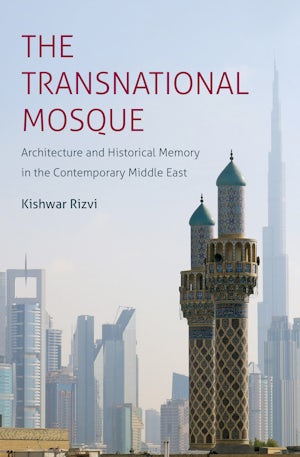The Transnational Mosque
Architecture and Historical Memory in the Contemporary Middle East
By Kishwar Rizvi
296 pp., 6.125 x 9.25, 25 color plates., 12 drawings, 78 halftones, 5 maps, notes, bibl., index
-
Hardcover ISBN: 978-1-4696-2116-6
Published: November 2015 -
Paperback ISBN: 978-1-4696-5912-1
Published: February 2020 -
E-book EPUB ISBN: 978-1-4696-2117-3
Published: October 2015 -
E-book PDF ISBN: 979-8-8908-4355-5
Published: October 2015
Islamic Civilization and Muslim Networks
Buy this Book
- Hardcover $39.95
- Paperback $32.50
- E-Book $19.99
For Professors:
Free E-Exam Copies
Awards & distinctions
Charles Rufus Morey Book Award, College Art Association
Gustav Ranis International Book Prize, Whitney and Betty MacMillan Center for International and Area Studies at Yale
A 2016 Choice Outstanding Academic Title
Rizvi delineates the transnational religious, political, economic, and architectural networks supporting mosques in Saudi Arabia, Iran, Turkey, and the United Arab Emirates, as well as in countries within their spheres of influence, such as Pakistan, Syria, and Turkmenistan. She discerns how the buildings feature architectural designs that traverse geographic and temporal distances, gesturing to far-flung places and times for inspiration. Digging deeper, however, Rizvi reveals significant diversity among the mosques--whether in a Wahabi-Sunni kingdom, a Shi‛i theocratic government, or a republic balancing secularism and moderate Islam--that repudiates representations of Islam as a monolith. Mosques reveal alliances and contests for influence among multinational corporations, nations, and communities of belief, Rizvi shows, and her work demonstrates how the built environment is a critical resource for understanding culture and politics in the contemporary Middle East and the Islamic world.
About the Author
Kishwar Rizvi is an architect and professor of Islamic art and architectural history at Yale University. She is the author of The Safavid Dynastic Shrine: Architecture, Religion and Power in Early Modern Iran and Modernism and the Middle East: Architecture and Politics in the Twentieth Century.
For more information about Kishwar Rizvi, visit
the
Author
Page.



